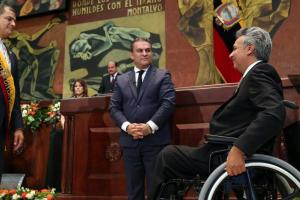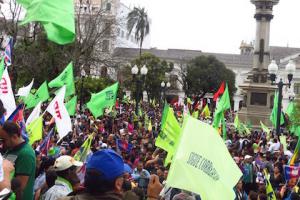U.S. Military Returns to Exert ‘Influence’ in Ecuador and the Region
The Progressive
 Correísmo marked a turning point in Ecuador's history. Correa launched his administration with measures such as buying back the country’s debt, renegotiating oil contracts and better tax collection. As Lenin Moreno takes office he will seek to find ways to continue the progress made in reducing poverty while overcoming divisions in society. Moreno was Correa’s vice president between 2007 and 2013 where he was a strng advocate for people with disabilities.
Correísmo marked a turning point in Ecuador's history. Correa launched his administration with measures such as buying back the country’s debt, renegotiating oil contracts and better tax collection. As Lenin Moreno takes office he will seek to find ways to continue the progress made in reducing poverty while overcoming divisions in society. Moreno was Correa’s vice president between 2007 and 2013 where he was a strng advocate for people with disabilities.
 In the recent weeks leading up to Pope Francis’ July 5 visit to Ecuador, the right-wing opposition has staged increasingly violent protests against President Rafael Correa’s government. Correa, who was re-elected in 2013 with 57% of the vote, has likened the opposition tactics of “mobilizations, provocations, victimizations,” to those used by the Venezuelan opposition. (In a 2010 attempted coup, President Correa was injured and held captive for 12 hours.)
In the recent weeks leading up to Pope Francis’ July 5 visit to Ecuador, the right-wing opposition has staged increasingly violent protests against President Rafael Correa’s government. Correa, who was re-elected in 2013 with 57% of the vote, has likened the opposition tactics of “mobilizations, provocations, victimizations,” to those used by the Venezuelan opposition. (In a 2010 attempted coup, President Correa was injured and held captive for 12 hours.)
Spread the word